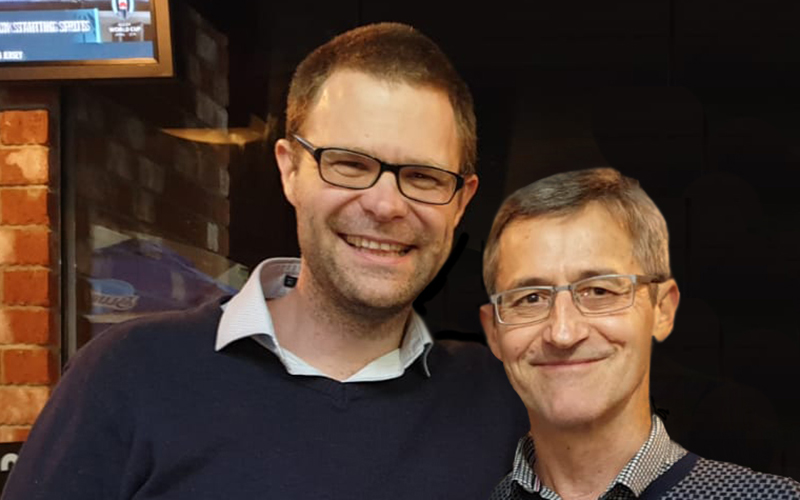
Director of CliniKids, Professor Andrew Whitehouse, and his colleague at the University of Western Australia, Professor Murray Maybery, have been identified as the world’s most frequent autism research collaborators of the decade, co-authoring the largest number of published journal articles in autism research internationally.
In a new report, released by US-based Spectrum, called ‘Researcher Connections: Understanding a decade of collaborations in autism science,’ the duo were recognised for their close and productive professional relationship which has led to 49 published papers over the past decade.
We sat down with Professor Whitehouse to get his thoughts on the achievement.
How did you react when you found out about this international recognition?
I’m quite surprised, but also thrilled. The frequency and longevity of our collaboration is not something we have ever focused on, but is just a by-product of a wonderful scientific friendship.
Tell us about your relationship and collaborations with Professor Maybery.
I think Murray and I diverge and converge in the most helpful ways. We’re a yin and yang of extroversion and introversion, a love of clinic and basic science, and an eye for the broader picture and the finer detail. But we converge in our love for Aussie Rules football, and a desire to find new ways to help support kids on the autism spectrum. Our conversations are 2/5ths autism science, and 3/5ths footy – which sounds pretty perfect to me.
What are some of your favourite projects that you’ve worked on together?
More recently, Murray and I have been working on a series of clinical trials of ‘pre-emptive’ autism interventions. Clinical trials are a long and often lonely journey, where an ability to ride the logistical and scientific ups and downs is a must. It is such an advantage to be able to walk down that path with a friend and collaborator of 20 years. We can test ideas with each other, and then pick each other up off the floor when setbacks inevitably arise.
How has collaborating with Professor Maybery enriched your research and career?
Inestimably! Scientific careers can be very isolating, not just in terms of the nature of the work but also in the logistics of the work: the grind of grant writing, the challenges of management, the dark nights of the soul thinking about a particular research project or direction. To have a colleague who challenges my thinking but supports me as a person is a true privilege. The career advantages that I have been lucky to acquire off the back of our collaboration – more rigorous thinking, new research directions - are overshadowed by the personal lessons I’ve absorbed about kindness and hard work.
What role do collaborations play in autism research? How has is changed or evolved over the last 10 years?
In clinical science, such as trialling clinical interventions, collaborations are essential. One argument for this could relate to the need for multi-site trials to support large sample sizes. This is true. However, to me, the most persuasive argument for collaboration is that the problems we are seeking to solve require as many people with as much experience as possible. Autism is as diverse as the whole of humanity, and it is simply impossible for one person to have an intimate understanding of every aspect of every person who enter our clinics. My research aim is to find the most effective interventions and supports for each and every person who walks into the clinic. I can either attack this problem by myself, or by getting as many people with as much experience around the same table. I know which approach I would back to achieve the aim.
What do you hope to see in the next ten years of autism research in terms of collaboration and teamwork?
I would love to see a more international approach to collaboration. We are often constrained in this regard by our national-focused funding agencies. However, there is so much to be gained by becoming as familiar with research at the other end of the world as the lab down the road. Each country has different health and disability systems, and these fundamental differences in clinical funding and practice throw up research insights that are entirely unknown to other nationalities. A focus on the clinical practice and research outcomes from any one particular country can create parochialism and blinkered thinking. By incentivising cross-nationality collaboration, we encourage each other to think about the same problem through a new lens, to imagine a new world, and to gain insights we simply wouldn’t have obtained from going to a presentation down the road.
You can read Spectrum US’s full Researcher Connections report here.
